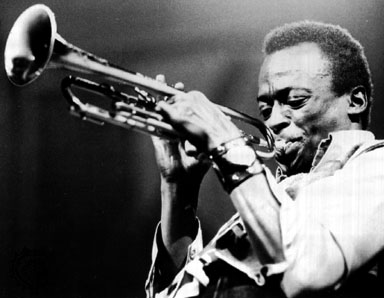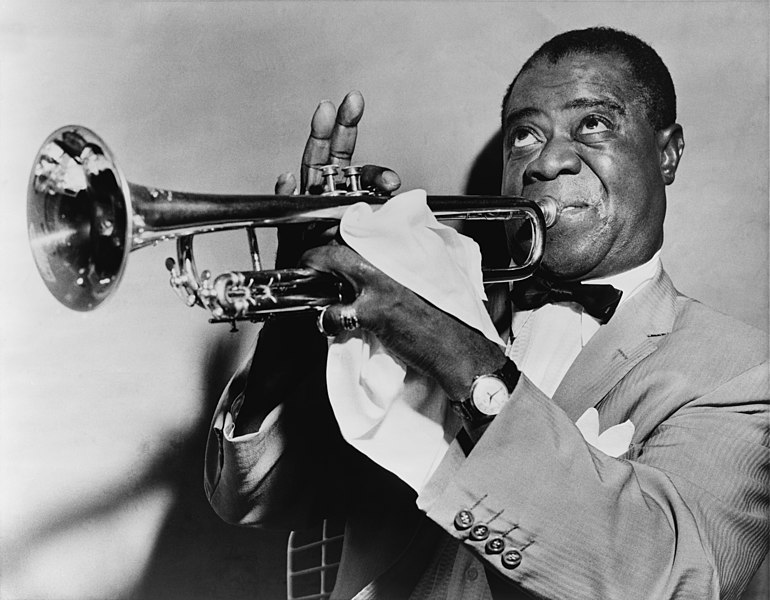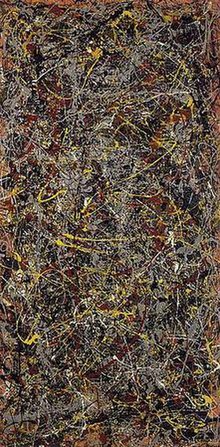Erics Research on Art During 1948
Friday, December 10, 2010
The Big Picutre
This was a time during which artists were breaking free of traditions and norms. Rigid discipline and ideas were abandoned and new ways were found to express creativity. A freestyle improvisational approach allowed artists so much more freedom to express themselves. Innovators from this time period set the stage for the rest of the creative work that was to follow, still capturing audiences now and forever.
Thursday, November 4, 2010
Art and Jazz Evolving Together
The 1920s and 1930s were a time when big band swing became the mainstream. Driven largely by Duke Ellington, people were dancing to Big Band jazz which was melody driven and metered on the straigtforward downbeat. Duke Ellingtons large orchestra was an example of how several musicians contributed within the ensemble to create big arrangements. The 1940s saw a shift away from big band jazz. Musicians started to create "musicians music" that was experimental and quite different from what people were used to. Bebop was really popularized by Miles Davis who invited improvisation and complex alterneative chord progressions. 
Bebop was new and unique because of its solo improv format. Bebop was considered by many an art in itself because instead of the songs being centered around a melody line, bebop tunes were centered around a soloist who improved around complex chords played by the rhythm section. Just like the way Pollack emphasised the creation of art as a critical element to each piece, Miles Davis wrote songs based around the solo line. The creation of each solo around a theme was the basis of the song. This radical approach is parallel to what was going on in the art world at the time. Artists were using innovative techniques in thier creations. Both art and jazz at the time were moved by artists using innovative techniques.

http://www.youtube.com/watch?v=nrisYOEpADY&feature=related
http://www.youtube.com/watch?v=P4TbrgIdm0E&feature=related

Bebop was new and unique because of its solo improv format. Bebop was considered by many an art in itself because instead of the songs being centered around a melody line, bebop tunes were centered around a soloist who improved around complex chords played by the rhythm section. Just like the way Pollack emphasised the creation of art as a critical element to each piece, Miles Davis wrote songs based around the solo line. The creation of each solo around a theme was the basis of the song. This radical approach is parallel to what was going on in the art world at the time. Artists were using innovative techniques in thier creations. Both art and jazz at the time were moved by artists using innovative techniques.

http://www.youtube.com/watch?v=nrisYOEpADY&feature=related
http://www.youtube.com/watch?v=P4TbrgIdm0E&feature=related
Thursday, October 21, 2010
From Paris to New York
Leading up to and during World War 2, many important european artists and art dealers escaped the treachery of the nazis and moved to New York City. Paris had been the hub of the art world until WW2 made the scene impossible to thrive in. New York City became the new hub of the art world were new American artists began a series of innovations leading the way to Abstract Expressionism. Arshile Gorky was one of the major forces at the beginning Abstract Expressionism.
 Jackson Pollocks innovative methods of action painting
Jackson Pollocks innovative methods of action painting really cemented abstract expressionism into the art world during the 1940s. He was into the experience of creating. By not using the traditional easel and paintbrush techniques Pollock opened the door to countless possibilities available to artists. By laying out large pieces of canvass on the floor and literally attacking it from all sides his work looked spontaneous even though he always carefully planned them. 

Friday, October 15, 2010
Just Getting Started
Just starting to do some backround research here in the library. Ive found some events that took place in 1948 specifically: The Palestine War, Treaty of Brussels and Burma gains independance. Looking for a broader source I searched Wikipedia for 1940's and found some more major events. World War 2 dominated the first half of the decade ending in 1945. Noticable achievements include the first computers, Nuclear Power, and Jet Propulsion. Many technological achievements were made in conjunction with WW2. A major artist during this time period, mentioned to me by Mr. Lieber, was Jackson Pollock.


Subscribe to:
Comments (Atom)